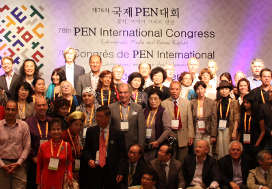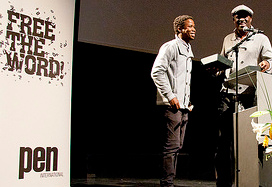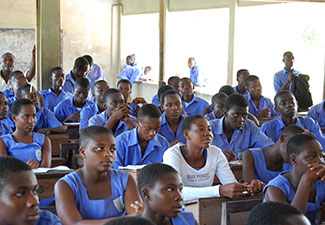Pen International: Freedom Of Expression as Basic Human Right

by Milena Rampoldi, ProMosaik e.V. – A very important interview with Ann Harrison, Pen International. ProMosaik e.V. is convinced of the essential importance of freedom of expression in all fields of work, life, and also in socio-political activism. We talked to Anna Harrison to explain us the work and committment of Pen International for freedom of expression as a basic human right. Images: www.pen-international.org
Milena Rampoldi: Which are the main objectives of PEN international?
Ann Harrison: Our charter defines
our objective as a balance between the defence of Freedom of Expression and the
commitment of PEN members to use “at all
times what influence they have in favour of good understanding and mutual
respect between nations.”
our objective as a balance between the defence of Freedom of Expression and the
commitment of PEN members to use “at all
times what influence they have in favour of good understanding and mutual
respect between nations.”

MR: Which are
the most important measures to improve freedom of expression and a literature
without borders?
the most important measures to improve freedom of expression and a literature
without borders?
AH: Freedom of
expression is a basic human right, guaranteed for the citizens of nations
worldwide that are signatories to international human rights treaties such as
the International Convention on Civil and Political Rights. Freedom of
expression means freedom to speak and to be critical of individuals, ideas and
governments; it means freedom to write, freedom to read and freedom of access
to information and knowledge. It includes the right to share ideas, information
and knowledge in all media. It embraces everyone from individual poets,
bloggers, journalists, writers, publishers, artists and musicians and their
readers and audiences.
expression is a basic human right, guaranteed for the citizens of nations
worldwide that are signatories to international human rights treaties such as
the International Convention on Civil and Political Rights. Freedom of
expression means freedom to speak and to be critical of individuals, ideas and
governments; it means freedom to write, freedom to read and freedom of access
to information and knowledge. It includes the right to share ideas, information
and knowledge in all media. It embraces everyone from individual poets,
bloggers, journalists, writers, publishers, artists and musicians and their
readers and audiences.

Many
nations defy the international covenants to which they are signatory, and
restrict freedom of expression. This is done through legislation, through
states of emergency declared in times of war, and then never removed, through
targeted attacks on individuals critical of governments, and individual
leaders, and institutions like religion and the monarchy. It takes the form of
impunity for crimes against freedom of expression, such as the murder and
disappearances of journalists, and extended periods of detention without trial,
and weak and corrupt judiciaries that result in flawed and unfair trials, and
extended sentences for minor crimes. It has come to include rampant digital
surveillance which is not only an invasion of privacy but is often used to
create evidence for the ‘crimes’ of reporting and sharing knowledge and
information.
nations defy the international covenants to which they are signatory, and
restrict freedom of expression. This is done through legislation, through
states of emergency declared in times of war, and then never removed, through
targeted attacks on individuals critical of governments, and individual
leaders, and institutions like religion and the monarchy. It takes the form of
impunity for crimes against freedom of expression, such as the murder and
disappearances of journalists, and extended periods of detention without trial,
and weak and corrupt judiciaries that result in flawed and unfair trials, and
extended sentences for minor crimes. It has come to include rampant digital
surveillance which is not only an invasion of privacy but is often used to
create evidence for the ‘crimes’ of reporting and sharing knowledge and
information.
PEN
concerns itself with both the systemic attacks on freedom of expression, in the
name of anti-terrorism for example, and with individual cases of writers who
are threatened, imprisoned and killed. Through our advocacy and campaign work,
and through our work on translation and the protection of all languages, we
dedicate ourselves to the distribution of literature across borders.
concerns itself with both the systemic attacks on freedom of expression, in the
name of anti-terrorism for example, and with individual cases of writers who
are threatened, imprisoned and killed. Through our advocacy and campaign work,
and through our work on translation and the protection of all languages, we
dedicate ourselves to the distribution of literature across borders.
MR: Tell us
about the problem of imprisoned writers and authors. What can we do to help
them?
about the problem of imprisoned writers and authors. What can we do to help
them?
AH: In 2014,
the PEN Writers in Prison Casebook documented more than 900 individual
cases around the world. PEN campaigns actively on these cases, by engaging PEN
centres (more than 150 centres in more than 100 countries) in long-term
advocacy with governments, international bodies like the UN, the Inter-American
Court, and the European Union. PEN centres adopt individual imprisoned or
threatened writers as honorary members, and engage with them and their families
if possible. PEN campaigns in traditional and social media, targets specific
countries or regions in reports, conducts formal interventions in the form of
missions and research trips and advocates before international human rights
bodies such as the UN Human Rights Council, the UN Human Rights Committee and
the Committee on Economic, Social and Cultural Rights and regional institutions
such as the East African Court of Justice and the African Court on Human and
Peoples’ Rights.
the PEN Writers in Prison Casebook documented more than 900 individual
cases around the world. PEN campaigns actively on these cases, by engaging PEN
centres (more than 150 centres in more than 100 countries) in long-term
advocacy with governments, international bodies like the UN, the Inter-American
Court, and the European Union. PEN centres adopt individual imprisoned or
threatened writers as honorary members, and engage with them and their families
if possible. PEN campaigns in traditional and social media, targets specific
countries or regions in reports, conducts formal interventions in the form of
missions and research trips and advocates before international human rights
bodies such as the UN Human Rights Council, the UN Human Rights Committee and
the Committee on Economic, Social and Cultural Rights and regional institutions
such as the East African Court of Justice and the African Court on Human and
Peoples’ Rights.

PEN has
been doing this work informally since its creation in 1921, and more formally
since 1960 when the Writers in Prison Committee was created. In recent years,
PEN has engaged with mechanisms such as the UN, where PEN has consultative
status, and specifically by contributing to the Universal Periodic Review of
all nations’ human rights record. PEN has also become very active in the
protection of writers at risk by helping to find solutions for persecuted
writers, whether temporary refuge for writers inside or outside their own
countries, providing emergency grants and working directly with writers in
exile, in collaboration with PEN centres.
been doing this work informally since its creation in 1921, and more formally
since 1960 when the Writers in Prison Committee was created. In recent years,
PEN has engaged with mechanisms such as the UN, where PEN has consultative
status, and specifically by contributing to the Universal Periodic Review of
all nations’ human rights record. PEN has also become very active in the
protection of writers at risk by helping to find solutions for persecuted
writers, whether temporary refuge for writers inside or outside their own
countries, providing emergency grants and working directly with writers in
exile, in collaboration with PEN centres.
MR: How important is translation work for PEN International?
AH: The
81st International Congress has just approved the Quebec
Declaration on Literary Translation and Translators, which states that
“All cultures are not equal when it comes to translation. Some cultures
translate by choice, others by obligation. Translation is a key to the
protection of languages and cultures.”
81st International Congress has just approved the Quebec
Declaration on Literary Translation and Translators, which states that
“All cultures are not equal when it comes to translation. Some cultures
translate by choice, others by obligation. Translation is a key to the
protection of languages and cultures.”
Translation
is crucial and we have always understood it to go hand in hand with linguistic
rights. We promote literature and encourage translation of literature into
all languages as a means of fostering dialogue and mutual understandings
between cultures and across borders. PEN is as respectful of authors and
original texts as it is of translators and advocates for them to be accepted as
creators in their own right.
is crucial and we have always understood it to go hand in hand with linguistic
rights. We promote literature and encourage translation of literature into
all languages as a means of fostering dialogue and mutual understandings
between cultures and across borders. PEN is as respectful of authors and
original texts as it is of translators and advocates for them to be accepted as
creators in their own right.
MR: Tell us
something about the long history of PEN international and what changed over
time.
something about the long history of PEN international and what changed over
time.

AH: PEN
International will be 100 years old in 2021. At its inception, in London, PEN
saw itself principally as a social club for writers to make use of when
travelling; it also aimed, in the wake of the horrors of World War I, to
promote mutual understanding between nations. But very soon, with the rise of
fascism, PEN transformed into the leading association campaigning for free
expression and personal freedoms [see PEN Charter]. Over the
course of a century, it has continued to expand and professionalise, now with
150 PEN Centres and roughly 25,000 members. http://www.pen-international.org/our-history/
International will be 100 years old in 2021. At its inception, in London, PEN
saw itself principally as a social club for writers to make use of when
travelling; it also aimed, in the wake of the horrors of World War I, to
promote mutual understanding between nations. But very soon, with the rise of
fascism, PEN transformed into the leading association campaigning for free
expression and personal freedoms [see PEN Charter]. Over the
course of a century, it has continued to expand and professionalise, now with
150 PEN Centres and roughly 25,000 members. http://www.pen-international.org/our-history/


